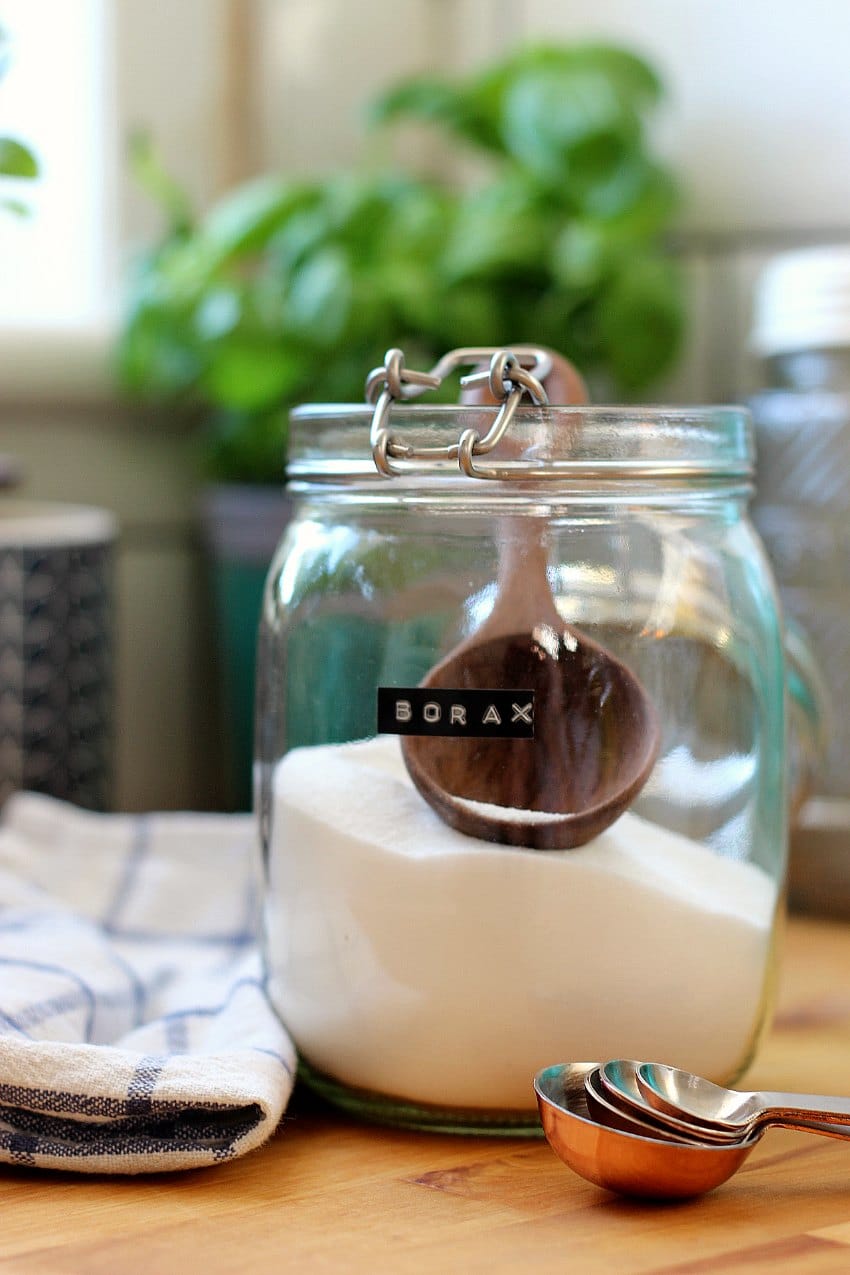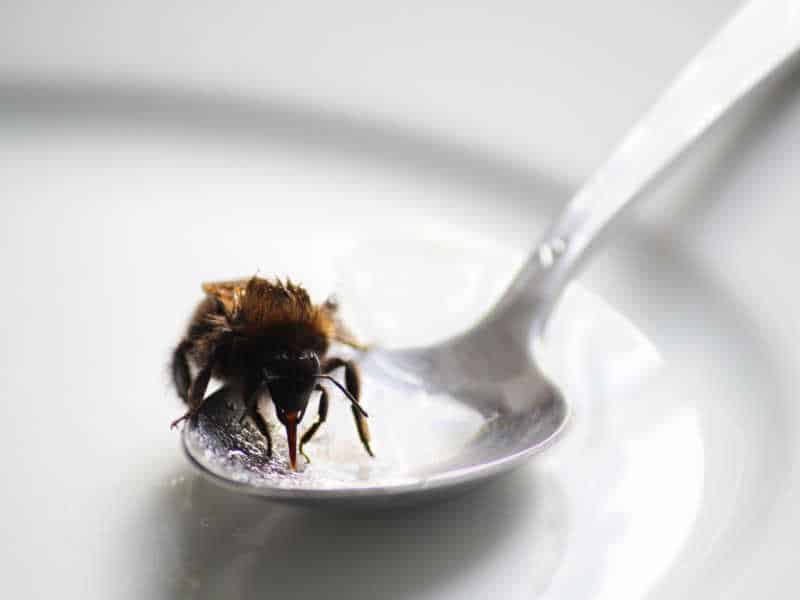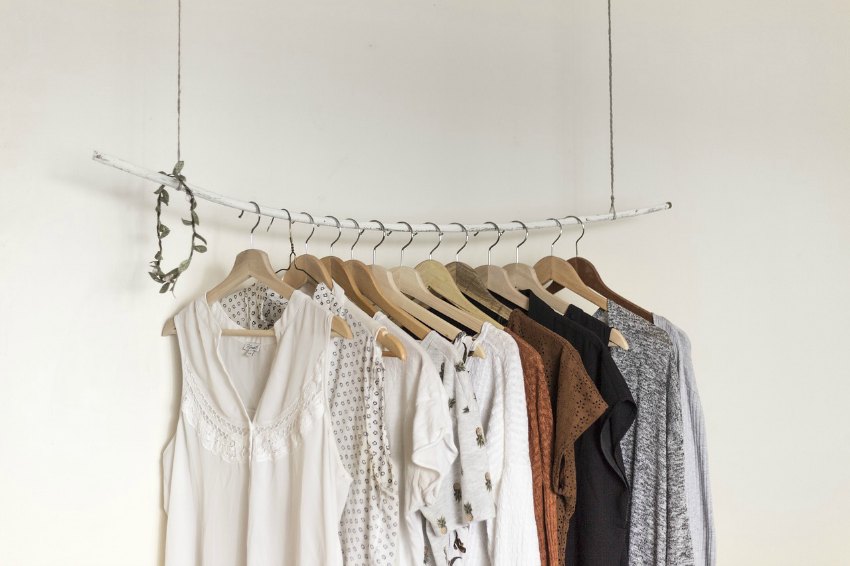What Is Borax & Is It Safe For Cleaning With?
To support the running costs of Moral Fibres, this post contains affiliate links. This means Moral Fibres may earn a small commission, at no extra cost to readers, on items purchased through these links.
Today let’s talk borax. Specifically, what is borax, and is it safe for cleaning with? You see, in my green cleaning kit, I always have a box of borax to hand. It’s a handy ingredient to have. Especially when there are so many uses for borax around the house.
Yet every time I mention borax here on the blog a well-meaning person or two often comments, telling me that I shouldn’t be using it in my home or encouraging Moral Fibres readers to use it in their homes. Often claims are made that borax is dangerous, and effects on fertility are cited.
I genuinely appreciate this concern, I really do. And not wanting to risk my or my family’s health, or the health of Moral Fibres readers, I have done quite a bit of research into if borax is safe to use around the house. I thought I’d share the results of my research here in the hope that it can be helpful to others considering using borax in their home.
Borax Banned In The UK & EU
To get started, it is important to know that in the UK and EU you can no longer buy borax.
Back in 2010, the EU decided that the ‘Borate’ group of chemicals – the group that Borax belongs to – may be potentially hazardous to health.
Borax was therefore banned from sale in the EU. And even with Brexit coming into place in 2020, it is still banned in the UK. Instead, in the EU and UK, “Borax Substitute” is the only equivalent you can buy for your cleaning and laundry needs. It may be labelled as Borax in your local shop, but it will be Borax Substitute.
We’ll get on to the what is borax substitute question in a moment!
Borax: The Science Part
Let’s look at the chemical differences between Borax and Borax Substitute:
What is Borax?
Borax occurs naturally, being produced by the repeated evaporation of seasonal lakes.
The chemical name of Borax is Sodium Tetraborate. The borate at the end there signifies it’s a boron compound. All borates can be considered derivatives of boric acid.
What is Borax Substitute?
The chemical name of Borax Substitute is Sodium sesquicarbonate. This is a mixed crystal of Sodium Carbonate (also known as washing soda or soda crystals) and Sodium Bicarbonate (also known as baking soda or bicarbonate of soda).
Borax substitute has similar properties and a similar pH level to borax, which is why it makes for a good substitute. It’s commonly used in cleaning because it is gentler than washing soda yet stronger than baking soda. It’s particularly useful when it comes to doing laundry because borax substitute is cold-water-soluble. This is unlike washing soda, which cakes with cold water.

Is Borax Substitute Safe?
Is Borax Substitute safe? It is considered a product that is safe to use in a variety of applications – from use in cosmetics to cleaning your home and even in the food we eat. Don’t just take my word for it, let’s look at the evidence:
Borax’s Historical Uses
Sodium sesquicarbonate is included on the INCI list of approved cosmetic ingredients.
Cosmetically it has traditionally been used in bath salts and bath bombs, due to its water-softening properties. It’s also found in hair care products and deodorants.
Outside of the cosmetics sphere, it’s also heavily used. From swimming pools to water treatment plants, and as a phosphate-free replacement for cleaning.
Surprisingly, it’s also used in food. Sodium sesquicarbonate, is, in small amounts, FDA-approved as a food additive in the US. Here it’s used as an anti-caking agent, to regulate acidity, and as a raising agent. Interestingly, it’s not food approved in the EU or Australia.
Is Borax Substitute Safe For Cleaning With?
Borax substitute’s long history aside, what about its safety?
I did link to a report here, that was probably the most comprehensive I’ve found on whether borax substitute is safe to use. Unfortunately, it’s no longer available, so whilst I source a reputable replacement, let me summarise the main findings:
Borax substitute is not considered to be harmful to health or to the environment. It may cause slight irritation to sensitive skin. Borax substitute may irritate the eyes if the dust gets in. And, lastly, it could be harmful if ingested in large quantities. Apart from that, there are no main concerns.
To double and triple-check, I kept up with my research. I wanted to dot the i’s and cross the t’s if you will. What I found was that the Environmental Working Group has, despite gaps in their data, classified Sodium Sesquicarbonate as low risk. This means no serious issues have been identified.
Similarly, the PAN Pesticides Database has so far found no risk. Meanwhile, this scientific journal found that in high doses in rats it caused conjunctivitis and skin irritation. However, they concluded it is safe to use in cosmetics.
My Conclusion?
My conclusion? I’m perfectly happy to use Borax Substitute in my house for all my green cleaning needs – I think it is a safe and non-toxic product. I do, of course, adhere to the general principles of storing cleaning products – homemade or shop-bought – away from children and pets.
Is Borax Safe For Cleaning With?
We’ve now established that Borax Substitute is safe. However, this is all well and good for my fellow UK and EU readers. But what about readers from other countries? As I’m recommending Borax Substitute, but unaware if Borax Substitute is available in your country, I feel like I’ve got a duty of care to find out if Borax (the Sodium Tetraborate stuff) is safe too.
So, is borax safe? It turns out this question is a bit harder to answer. It’s a bit of a grey area, so if you are not in the UK or EU then I’m afraid you’ll have to make up your own mind. Here’s what I’ve found, so you can decide for yourself.
Let Me Present the Facts
Studies cite that they have tested either sodium tetraborate or boric acid. However, if you remember from the science part at the top of this article, sodium tetraborate is not boric acid, it’s a derivative of boric acid. There’s quite a bit of a difference, chemically. However, the studies on whether borax is safe or not are somewhat vague.
Boron is an element essential for human health. It’s pivotal for healthy bones, joints, and dental enamel. It’s also important in regulating the absorption and metabolism of several elements – including magnesium, calcium, and phosphorous.
You can even buy boron food supplements. Excess boron tends to be excreted out of the body, suggesting that boron, and its derivatives, do not bio-accumulate in the body.
Borax is commonly used in natural laundry powders. So far I haven’t been able to find any deaths directly attributable to borax or the use (or misuse) of natural laundry powders.
However, it’s a different picture when you look at conventional alternatives to natural laundry powder, such as detergent capsules.
I have found reports of 1,500 cases of poisoning from detergent capsules in three years. The same article reports that one child a day had to be hospitalised in 2012 and 2013. What’s more, one child has died from detergent capsule poisoning.
Known Studies on the Safety of Borax
The EU banned borax in 2010 due to claims of impacts on reproductive health. This ban was implemented following studies on rodents who were fed high – some might say abnormally high – doses of borax.
The only study I can find looking at the potential impact of borax on human reproductive health is this study. This investigates the reproductive effects of boron exposure in workers employed in a boric acid production facility.
It is a bit of a flawed study because it relates to boric acid, rather than borax itself. However, that’s all the information we have to go on.
The study found that the factory workers – representing worst-case exposure conditions to boric acid/borates – are considerably lower than exposures that have previously led to reproductive effects in experimental animals. No ill effects on the worker’s reproductive health could be found.
The study concluded that “dose levels of boron associated with developmental and reproductive toxic effects in animals are by far not reachable for humans under conditions of normal handling and use“. Therefore even if you are handling borax all day every day, like these workers are, you are highly unlikely to encounter any problems.
Other Key Borax Points
Borax is not a known carcinogen. However, like borax substitute, it can irritate sensitive skin. There are also reports of borax inhalation irritating airways. I would recommend taking care when using borax, to avoid inhalation.
Some people have reported concern about the effects of clothes washed in borax. However, borax is poorly absorbed through undamaged skin. If you use borax in your laundry, the rinse cycle on your washing machine should take care of rinsing away any excess borax.
I think it’s also important to bear in mind that many benign things we have in our homes are harmful in high concentrations. Salt, for example, is harmful in high doses – and can be lethal at high enough doses – yet we happily sprinkle it on our food. Although do note that I wouldn’t recommend eating borax at any dosage
So, What’s The Answer? Is Borax Safe For Cleaning With?
I don’t want to tell you if it’s safe for you to use borax or not. I don’t feel it’s my place. Instead, I want to present the facts so that you can make up your mind.
Personally? Based on what I’ve found out, if stored out of the reach of kids and pets I would be quite happy to use borax in my house.
I feel that conventional laundry powders and liquids and bleach-based cleaning products pose more of a risk to human health and to waterways, but that is just my opinion. I’d encourage you to do your own research to work out if using borax is best for you or not.
What are your thoughts? Is borax safe? Are you happy using borax substitute? Do you feel happy using it in place of Borax? If so, what do you use borax for?
Found this post useful? Please consider buying me a virtual coffee to help support the site’s running costs.




